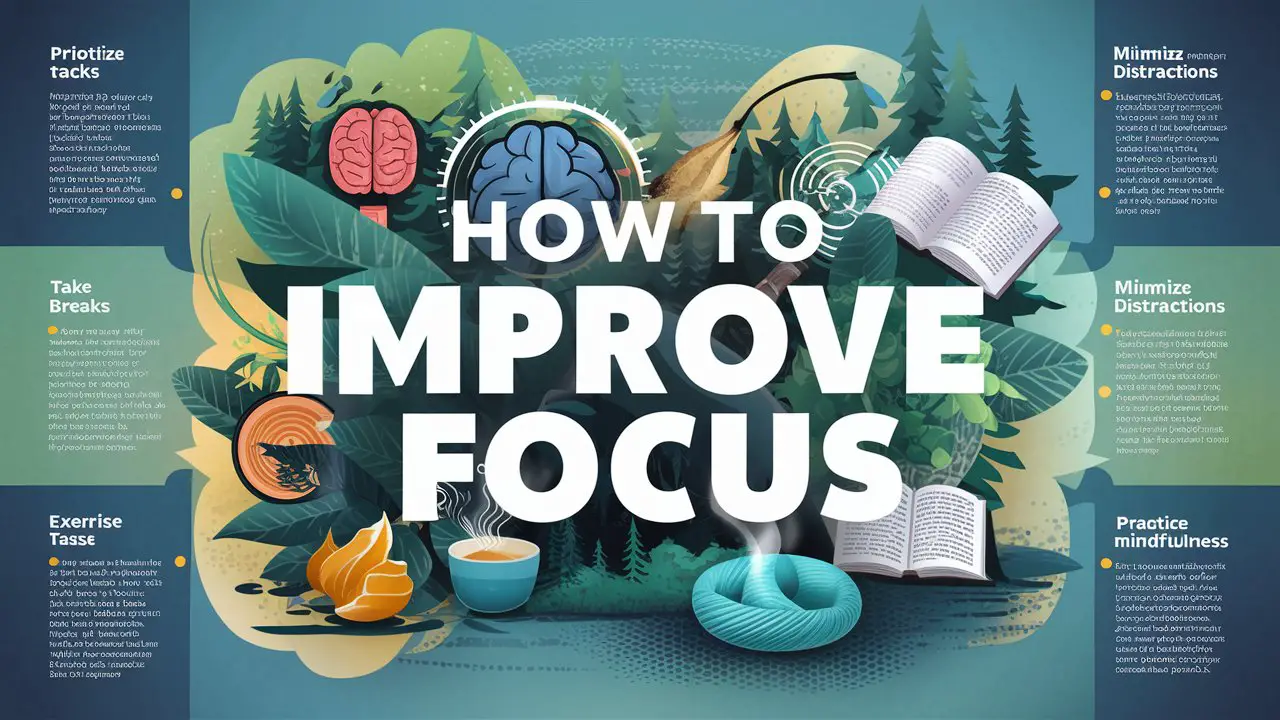Introduction
Focus is the mental ability to direct and sustain attention on a particular task or activity. It is a critical cognitive skill that plays a vital role in achieving goals and maintaining productivity. In our fast-paced world, where distractions are abundant, mastering focus has become more challenging yet more crucial than ever.
The importance of focus extends beyond productivity; it influences learning, decision-making, and overall mental well-being. Maintaining focus can be difficult due to numerous challenges, including digital distractions, stress, and the constant demand for multitasking. This article will explore various strategies and techniques to improve focus, helping individuals enhance their cognitive performance and achieve their goals.
Types of Focus
Understanding the different types of focus is essential to improve this skill effectively:
- Sustained Focus: The ability to maintain attention over prolonged periods. It is crucial for tasks requiring long-term concentration, such as studying or working on complex projects.
- Selective Focus: The skill of concentrating on specific information while ignoring distractions. This is important in environments where multiple stimuli compete for attention.
- Alternating Focus: The capacity to switch attention between different tasks efficiently. This type of focus is beneficial in dynamic situations requiring quick transitions.
- Divided Focus: The ability to manage multiple tasks simultaneously. While true multitasking is challenging, divided focus can help juggle various responsibilities.
Symptoms of Poor Focus
Identifying the symptoms of poor focus is the first step toward improvement:
- Common Signs of Distraction: Frequent daydreaming, difficulty completing tasks, and constant procrastination are typical indicators of poor focus.
- Uncommon Signs Indicating Focus Issues: Struggling to follow conversations, frequent forgetfulness, and increased errors in work may also suggest underlying focus problems.
Causes of Focus Problems
Focus problems can stem from various factors:
- Biological Factors: Neurotransmitter imbalances, ADHD, and other neurological conditions can impact focus.
- Environmental Factors: A noisy, cluttered, or chaotic environment can hinder concentration.
- Lifestyle Factors: Poor diet, lack of exercise, and inadequate sleep significantly affect focus and cognitive function.
Diagnosing Focus Issues
Diagnosing focus-related issues requires a comprehensive approach:
- Common Diagnostic Tools and Tests: Cognitive assessments and concentration tests help evaluate focus levels.
- Professional Assessments: Consultations with psychologists or neurologists can provide deeper insights and diagnoses.
Improving Focus Through Lifestyle Changes
Adopting healthier lifestyle choices can significantly enhance focus:
- Diet and Nutrition: Consuming brain-boosting foods rich in omega-3 fatty acids, antioxidants, and vitamins can improve cognitive function.
- Physical Exercise: Regular physical activity increases blood flow to the brain, enhancing mental clarity and focus.
- Sleep Hygiene: Quality sleep is crucial for cognitive restoration and sustained focus. Establishing a consistent sleep routine can improve attention span.
Mental and Cognitive Strategies
Mental training and cognitive exercises can boost focus:
- Mindfulness and Meditation: Practicing mindfulness increases awareness and concentration, reducing distractions.
- Cognitive Behavioral Techniques: Challenging negative thought patterns and replacing them with positive affirmations can enhance focus.
- Memory Enhancement Practices: Techniques like visualization and association strengthen memory and improve attention.
Technological Tools for Focus
Leveraging technology can aid in maintaining focus:
- Focus Apps and Software: Applications like Focus@Will and Forest encourage sustained attention through curated music and gamified tasks.
- Gadgets and Devices: Noise-canceling headphones and productivity timers help create a conducive environment for focus.
- Online Resources: Websites offering cognitive exercises and guided meditations provide valuable support for enhancing focus.
Workplace Strategies to Enhance Focus
Improving focus at work requires strategic interventions:
- Creating an Effective Work Environment: Organizing the workspace and minimizing clutter reduces distractions.
- Time Management Techniques: Methods like the Pomodoro Technique promote sustained focus by breaking tasks into manageable intervals.
- Avoiding Workplace Distractions: Setting boundaries, managing email notifications, and prioritizing tasks enhance productivity.
Educational Strategies for Students
Focus is essential for academic success, and educators play a significant role:
- Study Techniques: Active learning methods, such as summarizing and self-quizzing, improve focus and retention.
- Classroom Environment: Designing classrooms that reduce distractions and encourage engagement supports student focus.
- Role of Educators in Enhancing Focus: Teachers can employ strategies like clear instructions and interactive teaching to maintain student attention.
Case Studies and Personal Stories
Real-life examples demonstrate the power of improved focus:
- Real-Life Examples of Improved Focus: Individuals who have overcome focus challenges share their strategies and successes.
- Success Stories from Individuals: Personal accounts highlight the transformative impact of focus-enhancing techniques.
Expert Insights
Expert opinions provide valuable guidance on enhancing focus:
- Quotes from Psychologists and Neurologists: Insights from professionals offer evidence-based recommendations.
- Research Findings and Expert Opinions: Studies highlight the effectiveness of various focus-improving interventions.
Conclusion
Improving focus requires a multifaceted approach, combining lifestyle changes, mental strategies, and technological tools. By understanding the types of focus and recognizing the symptoms and causes of focus problems, individuals can implement effective strategies to enhance their attention and cognitive performance. Whether in the workplace, educational settings, or personal life, improved focus leads to greater productivity and success.
Improving focus is a journey that involves understanding one’s unique challenges and implementing personalized strategies. With dedication and the right techniques, anyone can master the art of focus, leading to a more fulfilling and productive life.














